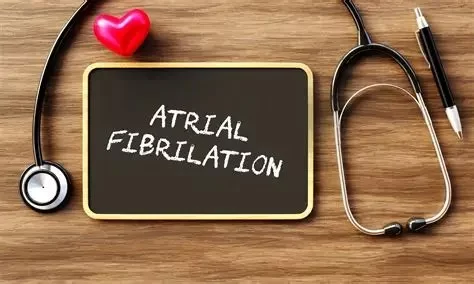Atrial Fibrillation: Understanding and Managing an Irregular Beat
Atrial fibrillation (AFib) is one of the most common types of irregular heartbeats, affecting millions of people worldwide. It occurs when the upper chambers of the heart, known as the atria, experience disorganized electrical signals, causing them to beat irregularly. This disruption can lead to various symptoms, including fatigue, dizziness, and shortness of breath. While it may sound alarming, with proper knowledge and management, many people living with AFib can lead healthy and fulfilling lives.
1. What Is Atrial Fibrillation?
Atrial fibrillation is a type of arrhythmia, or abnormal heart rhythm, where the heart beats irregularly and often rapidly. Unlike a normal heartbeat, which is coordinated between the heart's upper and lower chambers, AFib causes the atria to quiver instead of contracting normally. This leads to inefficient blood flow and increases the risk of blood clots, which can lead to stroke.
The causes of AFib can vary from person to person. Some individuals may develop the condition due to high blood pressure, heart disease, or other underlying health problems. In other cases, the cause remains unknown. Lifestyle factors like heavy drinking, smoking, and a sedentary lifestyle can also contribute to the development of AFib.
2. Common Symptoms of Atrial Fibrillation
People with atrial fibrillation may experience a variety of symptoms. These can range from mild to severe and may include:
- Palpitations: A feeling of fluttering or pounding in the chest, often accompanied by irregular heartbeats.
- Fatigue: Feeling unusually tired or weak, even after a good night’s sleep.
- Dizziness or Lightheadedness: Some individuals may feel lightheaded or faint, especially when standing up quickly.
- Shortness of Breath: Difficulty breathing, particularly during physical activity.
- Chest Pain: Some people may experience chest discomfort or tightness, which can be a warning sign of other heart issues.
While some people may not experience any symptoms at all, it's important to seek medical attention if you notice any of these signs. Untreated AFib can lead to serious complications like stroke and heart failure.
3. Managing Atrial Fibrillation
Although atrial fibrillation can be a challenging condition, there are many ways to manage it effectively. Treatment plans typically focus on controlling the heart rate, preventing blood clots, and managing symptoms. Your healthcare provider may recommend one or more of the following treatment options:
- Medications: Medications like blood thinners (anticoagulants) can help prevent blood clots. Other medications may be used to control heart rate and rhythm, reducing the risk of complications.
- Cardioversion: A procedure where the heart is "shocked" back into normal rhythm, often used when medications aren't effective.
- Ablation: In cases where medication and cardioversion are not successful, a procedure called catheter ablation may be used to destroy the tissue causing the irregular electrical signals.
- Lifestyle Changes: Managing underlying conditions like high blood pressure, adopting a heart-healthy diet, limiting alcohol consumption, and increasing physical activity can help manage AFib symptoms and prevent further complications.
4. Lifestyle Modifications to Reduce the Risk of Atrial Fibrillation
While some factors that contribute to AFib are out of our control, there are several lifestyle changes that can significantly reduce the risk or improve the management of atrial fibrillation. Here are some steps you can take to support your heart health:
- Exercise Regularly: Aim for at least 30 minutes of moderate activity most days of the week. Physical activity helps reduce the risk of heart disease, high blood pressure, and other conditions that contribute to AFib.
- Eat a Heart-Healthy Diet: Focus on foods that promote heart health, including plenty of fruits, vegetables, whole grains, and healthy fats. Limiting salt, sugar, and processed foods is also essential for managing high blood pressure.
- Limit Alcohol and Caffeine: Both alcohol and excessive caffeine intake can trigger or worsen AFib. Moderation is key to managing the condition.
- Manage Stress: Chronic stress can contribute to AFib, so finding ways to relax and unwind—whether through meditation, yoga, or simply enjoying nature—can help reduce your risk.
5. Real-Life Stories: People Living with Atrial Fibrillation
Understanding how others manage atrial fibrillation can provide insight and encouragement for those who are newly diagnosed. Here are a couple of stories from people who have successfully managed AFib and continued to live active, fulfilling lives:
Story 1: Jane, a 58-year-old teacher, was diagnosed with AFib after experiencing several episodes of dizziness and fatigue. She started a treatment plan that included medication, regular exercise, and dietary changes. Today, Jane is able to manage her AFib effectively and continues to enjoy her teaching career, knowing that with the right care, she can live a healthy life.
Story 2: John, a 64-year-old retiree, found out about his AFib diagnosis after a routine checkup. He was initially concerned but worked with his doctor to find the right medication and lifestyle changes. John now participates in a walking group and follows a heart-healthy diet, greatly reducing his symptoms and staying active.
6. The Importance of Regular Check-ups and Monitoring
If you have been diagnosed with atrial fibrillation, regular check-ups with your healthcare provider are essential for monitoring your condition. Your doctor will assess your treatment plan, adjust medications as needed, and check for any potential complications. You may also be asked to monitor your heart rate and report any new symptoms that arise.
By staying informed about your condition and following a comprehensive treatment plan, you can manage your AFib effectively and reduce the risk of serious complications.
If you are looking for more information on managing atrial fibrillation or other heart-related concerns, visit HeartCare Hub for expert advice and product recommendations tailored to your needs.





















